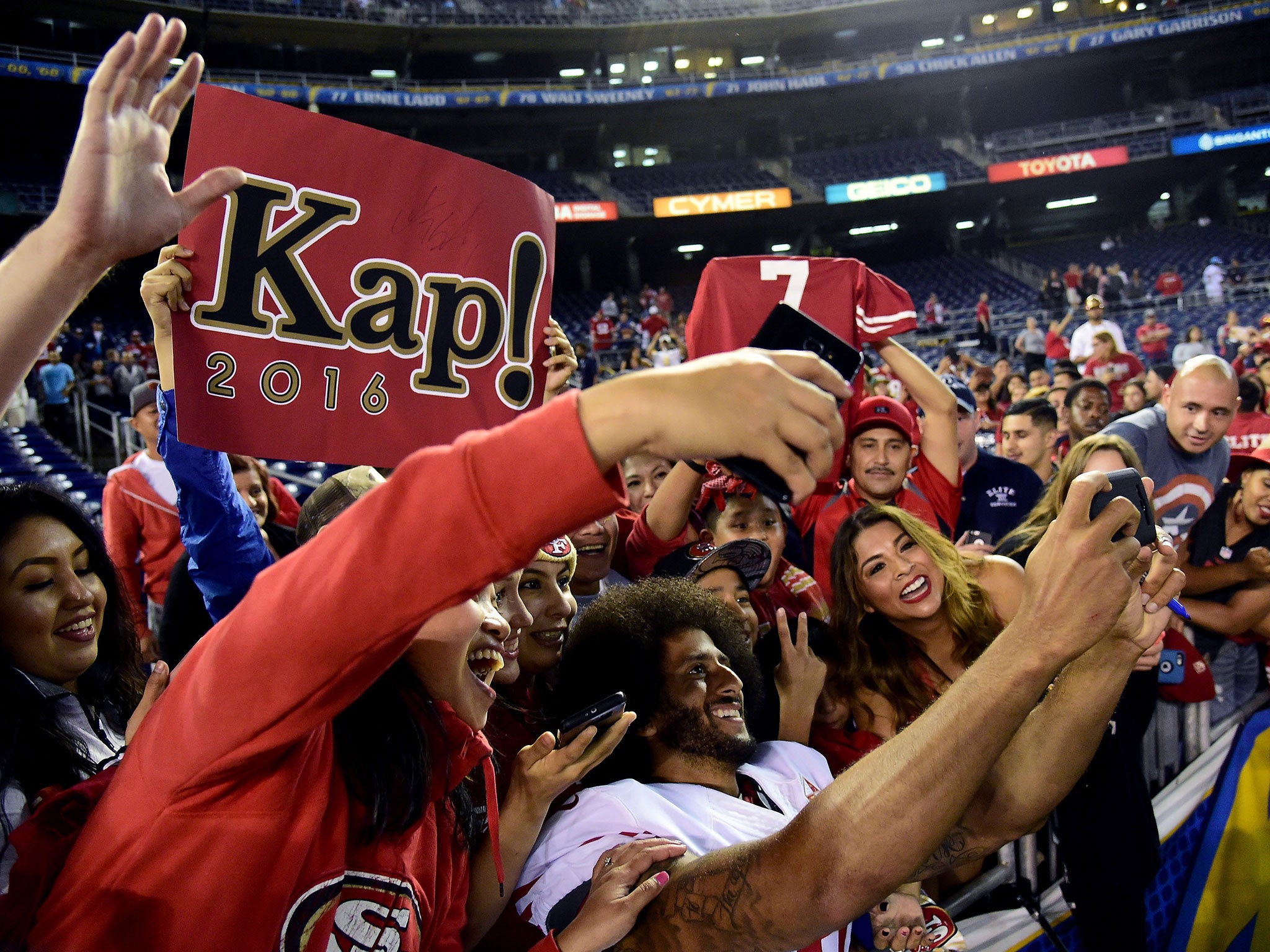Colin Kaepernick's stance shines light on NFL's rocky relationship with race
The 49ers quarterback has gone where many American sportsmen fear to tread

Colin Kaepernick may be a shadow of his former quarter-back self. But as the National Football League starts its new season on Thursday night, even in that diminished state he’s the only game in town.
You couldn’t ask for a more intriguing curtainraiser: a repeat of the Super Bowl barely seven months ago, between Cam Newton’s Carolina Panthers and the champion Denver Broncos as they enter Year One APM (After Peyton Manning). But the subject that still consumes everyone? The refusal of Kaepernick to stand for the playing of the Stars and Stripes before his San Francisco 49ers pre-season friendly against the Green Bay Packers on August 26.
Kaepernick’s furiously criticised deed has raised a host of issues: what exactly the national anthem symbolises; why the ostentatious patriotism that is now entwined with virtually every team sport in America; and whether members of those teams should use the anthem to make a political protest – in Kaepernick’s case in support of the Black Lives Matter movement, and against the persisting inequality experienced by blacks in national life, in contrast to the principles upon which the country was founded.
And for that protest, he’s chosen the gaudiest, most patriotic stage of all, the NFL. In the process he’s subtly extended the debate over race in the League, the giant money-minting machine that is standardbearer for the sport that has long since supplanted baseball as America’s true ‘national pastime.’
For the last few years two non-racial controversies have dominated headlines about the NFL – ever-mounting evidence that the sport causes life-destroying brain damage to many of its players, and a string of cases of off-field violence, domestic and otherwise, involving NFL players. But though relatively little noted of late, the race issue lingers.
At first glance, the NFL, 70-odd per cent of whose players are African-American, seems a model of diversity. Look a little more closely though and a different picture emerges. On field and off field, the boss classes remain solidly white.
Of the League’s 32 quarterbacks – the most important positional player in any team sport – who start the new seasons’s first game, eight at most are likely to be black. And their number won’t include Kaepernick. He might have led San Francisco to its 2012 Super Bowl triumph, but his poor form even before the anthem fracas had seen him demoted to back-up for deputy Blaine Gabbert and spurred rumours the 49ers were ready to trade him.
Of the 32 head coaches who call the plays from the touchline, even fewer, only six, are black. In the boardrooms where the serious cash is raked in, matters are even more lopsided. Not one NFL team has a black majority owner: all are white save the Pakistani-American Shahid Khan of the Jacksonville Jaguars, who also owns Fulham Football Club of the Championship.
Indirectly, Kaepernick’s protest feeds into this argument. “I’m not Anti-American,” he said after kneeling during the anthem at the 49ers last pre-season game against San Diego last week, refuting accusations he was unpatriotic. “I love America, I love people, that’s why I’m doing this. I want to help make America better.”
Alas, not many believed him. Crowds booed him, the police union is threatening not to work at 49ers home games, and Donald Trump graciously suggested Kaepernick go find another country to live in. Others accused him of hypocrisy and biting the hand that so generously feeds him: though Kaepernick is bi-racial, his black birth father left before he was born, and he was adopted and raised by a white family.
The uproar is understandable. White Americans simply aren’t used to having prominent sportsmen ask awkward questions that challenge their comfort zone. It wasn’t so once, when Ali flaunted his blackness in the 60s, and sprinters Tommy Smith and John Carlos raised black-gloved fists at the 1968 Mexico Olympics.
All paid a heavy price, and after the turbulent 60s a long silence settled in, especially when professional athletes hit the financial big time in the 1980s. From both Michael Jordan and Tiger Woods, who succeeded Jordan as America’s most famous sporting figure, nary a word on anything controversial. Understandably, Kaepernick’s gesture has been a shock.
But support has started to be heard, not least from President Obama, whose own origins uncannily resemble those of Kaepernick. The player, Obama declared, was "exercising his constitutional right”, and showing “he cares about some real, legitimate issues that have to be talked about”. This 2016 election is already ferociously polarised; Kaepernick threatens to polarise it further.
Meanwhile, his team-mate Eric Reid also knelt during the anthem at the San Diego game, while Jeremy Lane of the Seahawks sat out the anthem in the Seattle’s final preseason game. Now the question is, who’ll sit, kneel or find some other way of not standing during the anthem when the real NFL business starts this weekend? A safe prediction: not very many.
Subscribe to Independent Premium to bookmark this article
Want to bookmark your favourite articles and stories to read or reference later? Start your Independent Premium subscription today.

Join our commenting forum
Join thought-provoking conversations, follow other Independent readers and see their replies